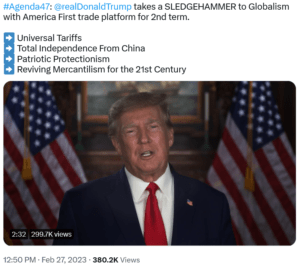Reshoring may very well become a topic of hot political debate between now and the next presidential election.
 Judging by a video released by former President Trump on Feb. 27, the globalist skeptics within the Republican Party, which can count on the majority of Republican voters nowadays, will be asking for industrial revival. Tariffs on Chinese imports, imposed in 2018 by the Trump administration, were not enough to persuade many American businesses to relocate supply elsewhere. Margins on China imports are that high, and China depreciated its currency by over 11%. Those who did leave typically sourced to even lower cost, lower regulation nations – namely in Southeast Asia, a new outpost of Chinese corporations. Trump, meanwhile, is now calling for reshoring, without saying the word.
Judging by a video released by former President Trump on Feb. 27, the globalist skeptics within the Republican Party, which can count on the majority of Republican voters nowadays, will be asking for industrial revival. Tariffs on Chinese imports, imposed in 2018 by the Trump administration, were not enough to persuade many American businesses to relocate supply elsewhere. Margins on China imports are that high, and China depreciated its currency by over 11%. Those who did leave typically sourced to even lower cost, lower regulation nations – namely in Southeast Asia, a new outpost of Chinese corporations. Trump, meanwhile, is now calling for reshoring, without saying the word.
Trump said the globalist agenda “ripped the industrial heart” out of the United States. He said that “multinational agreements send our wealth overseas…and China is the biggest beneficiary.”
He said in his statement Monday that the U.S. needs an overhaul of the tax system that rewards domestic production and taxes foreign companies that export American jobs, something President Biden has also focused on.
Trump, who once dubbed himself “Tariff Man”, spoke mostly on raising import taxes.
“We will phase in a system of universal, baseline tariffs on most foreign products. On top of this, higher tariffs will increase incrementally dependent on how much a country devalues their currency to take advantage of the United States,” Trump said. “As tariffs on foreign producers go up, (American corporate) taxes will go down. This will end our gaping trade deficits and bring in trillions of dollars pouring into the U.S. Treasury that will allow us to invest in American communities.”
The U.S. Treasury has collected $169 billion thanks to Trump’s China tariffs since August 2018.
Trump said the U.S. needs to end “unfair trade deals” and that the government needs to eliminate dependence on China, including revoking China’s Most Favored Nation trade status, something CPA supports.
“We will phase out imports from China of all essential goods, everything from electronics to steel to pharmaceuticals,” Trump said, in the event he were to win the White House in 2024 and could do such things.
The Biden administration has also been working on reducing global corporations’ ability to profit-shift offshore in order to minimize taxes. And he has gone after Wall Street by banning investments in hundreds of Chinese companies tied to its defense department.
Under the Inflation Reduction Act, signed into law by Biden last year, production tax credits were awarded to producers of solar, electric vehicles, and next-generation batteries for energy storage and EVs. This attracted billions of dollars in new U.S. investment by foreign multinationals.
Charles Benoit, CPA Trade Counsel, said Trump’s proposals are very welcome and are advancing the discourse on trade policy. “Back in 1947, we entered a non-reciprocal trade agreement with the world, known as the General Agreement on Tariffs and Trade (GATT). The GATT is still in operation, now overseen by the WTO. Of the 164 WTO nations, we’ve committed to lower tariffs than anyone else, a paltry 3.4% average. Few in Congress talk about it, but breaking this yoke and raising our base tariffs is of the utmost importance. President Trump has backed up his rhetoric about restoring manufacturing to America with excellent concrete tariff proposals, and in so doing has raised the bar.”
“Donald Trump is advancing some exciting new ideas here,” said CPA chief economist Jeff Ferry. “He is pointing out that an economic policy focused on production could generate millions of new manufacturing jobs. We’ve seen that the steel tariffs are leading to thousands of new high-paid jobs as steel mills open up and the pro-US solar, batteries and chips policies will likely lead to hundreds of thousands more well-paid jobs. If we boosted tariffs enough to pay for the subsidies, it would cost the taxpayer nothing and the benefit would come in a higher long-term economic growth rate, which is the ultimate goal.”
Trump also said the U.S. should ban government contracts with any company that is outsourcing to China. He said that the U.S. can still get along with China, but that “we will become a manufacturing powerhouse like the world has never seen before.”
U.S. manufacturing doesn’t only benefit from lower taxes and tariffs. Where needed, it is important for governments to provide incentives in key industries where supply chains are deemed critically important for the nation’s economic survival and health.
The CHIPS Act did this with semiconductors. And in some ways, the IRA is seen doing this for domestic solar manufacturers and the burgeoning electric vehicles segment.
Europe and South Korea have been up and arms over the IRA tax incentive for domestic EV producers, with BMW recently announcing a billion-dollar investment in a U.S. EV assembly line to take advantage of the law – investments that might have been made in Europe instead to serve to the U.S. market. It is unclear if Biden will give into the European Union, which is making the most noise about the IRA incentives. The EU enjoys a roughly $203 billion trade surplus with the U.S. To put that into perspective, the U.S. trade deficit with both Mexico and Canada is around $210 billion and those countries have a free trade agreement with the United States. Only China’s trade surplus with the U.S. is higher than Europe’s, coming in at $382 billion in 2022, according to Census data.
Record U.S. Goods Trade Deficit in 2022 As Electronics, Vietnam Imports Rise













